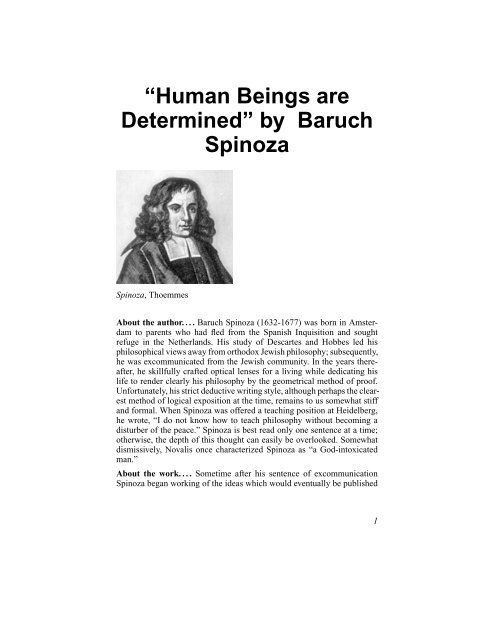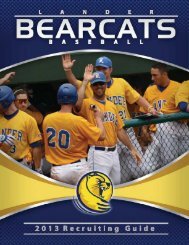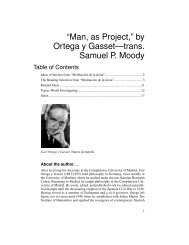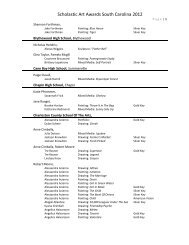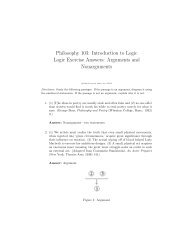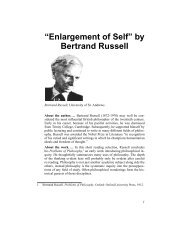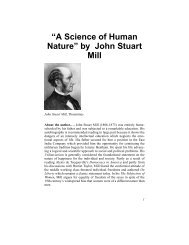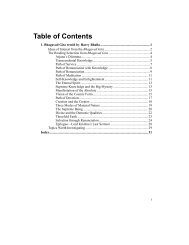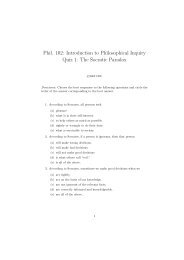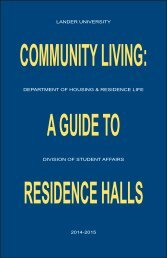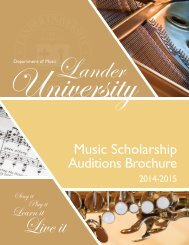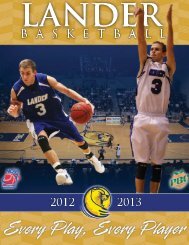“Human Beings are Determined” by Baruch Spinoza - Philosophy ...
“Human Beings are Determined” by Baruch Spinoza - Philosophy ...
“Human Beings are Determined” by Baruch Spinoza - Philosophy ...
Create successful ePaper yourself
Turn your PDF publications into a flip-book with our unique Google optimized e-Paper software.
<strong>“Human</strong> <strong>Beings</strong> <strong>are</strong><br />
<strong>Determined”</strong> <strong>by</strong> <strong>Baruch</strong><br />
<strong>Spinoza</strong><br />
<strong>Spinoza</strong>, Thoemmes<br />
About the author. . . . <strong>Baruch</strong> <strong>Spinoza</strong> (1632-1677) was born in Amsterdam<br />
to p<strong>are</strong>nts who had fled from the Spanish Inquisition and sought<br />
refuge in the Netherlands. His study of Descartes and Hobbes led his<br />
philosophical views away from orthodox Jewish philosophy; subsequently,<br />
he was excommunicated from the Jewish community. In the years thereafter,<br />
he skillfully crafted optical lenses for a living while dedicating his<br />
life to render clearly his philosophy <strong>by</strong> the geometrical method of proof.<br />
Unfortunately, his strict deductive writing style, although perhaps the cle<strong>are</strong>st<br />
method of logical exposition at the time, remains to us somewhat stiff<br />
and formal. When <strong>Spinoza</strong> was offered a teaching position at Heidelberg,<br />
he wrote, “I do not know how to teach philosophy without becoming a<br />
disturber of the peace.” <strong>Spinoza</strong> is best read only one sentence at a time;<br />
otherwise, the depth of this thought can easily be overlooked. Somewhat<br />
dismissively, Novalis once characterized <strong>Spinoza</strong> as “a God-intoxicated<br />
man.”<br />
About the work. . . . Sometime after his sentence of excommunication<br />
<strong>Spinoza</strong> began working of the ideas which would eventually be published<br />
1
<strong>“Human</strong> <strong>Beings</strong> <strong>are</strong> <strong>Determined”</strong> <strong>by</strong> <strong>Baruch</strong> <strong>Spinoza</strong><br />
as The Ethics, 1 a book published posthumously from the fear of persecution<br />
from the charge of the blasphemy of pantheism. 2 Pantheism should<br />
be distinguished from “panentheism” which is the view that gods <strong>are</strong> in<br />
all things. <strong>Spinoza</strong> believed, much as Socrates believed, the excellent life<br />
is the life of reason in the service of one’s own being. The soul seeks<br />
knowledge as a good; indeed, the soul’s highest good is knowledge of<br />
God. <strong>Spinoza</strong> argues that the mind and the body <strong>are</strong>, in reality, only one<br />
thing but can be thought of in two different ways. The person who understands<br />
how the soul is part of the system of nature also understands, at<br />
the same time, how the soul is part of God. In sum, <strong>Spinoza</strong>’s monism 3<br />
is the deductive exposition of existence as the complete unity of God and<br />
nature. According to this view, human beings have no free will, and the<br />
world cannot be evil.<br />
From the reading. . .<br />
“Thus, when men say that this or that physical action has its origin<br />
in the mind. . . they <strong>are</strong> using words without meaning. . . ”<br />
Ideas of Interest from The Ethics<br />
1. Explain as clearly as possible <strong>Spinoza</strong>’s two objections to the belief<br />
that human behavior is the result of the free will of the mind.<br />
1. <strong>Baruch</strong> <strong>Spinoza</strong>. The Ethics: Demonstrated in Geometric Order. Translated <strong>by</strong><br />
R.H.M. Elwes. 1883. Part III: On the Origin and the Nature of the Emotions—Note<br />
to Proposition 2.<br />
2. Pantheism is the doctrine that God is identical with all existing things. Often the<br />
view derives from spiritual motives, but a monist could be a strict materialist or a strict<br />
idealist.<br />
3. Monism is the doctrine that reality can only be the modifications deriving from one<br />
kind of subsistent entity. Often the view derives from spiritual motives, but a monist<br />
could be a strict materialist or a strict idealist. For <strong>Spinoza</strong>, everything that exists is<br />
both God and the system of nature, and the implicit pantheism (and the consequent<br />
threat of blasphemy) of this view provide one reason why his works were published<br />
posthumously.<br />
2 Reading For Philosophical Inquiry: A Brief Introduction
<strong>“Human</strong> <strong>Beings</strong> <strong>are</strong> <strong>Determined”</strong> <strong>by</strong> <strong>Baruch</strong> <strong>Spinoza</strong><br />
2. What counter-objection does <strong>Spinoza</strong> raise against his view that mental<br />
and physical states <strong>are</strong> merely coincidental and the mind neither<br />
controls the body nor controls events in the physical world?<br />
3. How does <strong>Spinoza</strong> define “decision” from the standpoint of thought,<br />
and how does he define it from the standpoint of extension? 4<br />
4. According to <strong>Spinoza</strong>, why do many persons believe human beings<br />
have free will? How can we become conscious or discover the causes<br />
of our decisions and the unconscious “appetites” upon which they<br />
depend?<br />
The Reading Selection from The<br />
Ethics<br />
[The Unknown Causes of Human Action]<br />
I can scarcely believe, until the fact is proved <strong>by</strong> experience, that men can<br />
be induced to consider the question calmly and fairly, so firmly <strong>are</strong> they<br />
convinced that it is merely at the bidding of the mind, that the body is set in<br />
motion or at rest, or performs a variety of actions depending solely on the<br />
mind’s will or the exercise of thought. However, no one has hitherto laid<br />
down the limits to the powers of the body, that is, no one has as yet been<br />
taught <strong>by</strong> experience what the body can accomplish solely <strong>by</strong> the laws of<br />
nature, in so far as she is regarded as extension. No one hitherto has gained<br />
such an accurate knowledge of the bodily mechanism, that he can explain<br />
all its functions; nor need I call attention to the fact that many actions <strong>are</strong><br />
observed in the lower animals, which far transcend human sagacity, and<br />
that somnambulists do many things in their sleep, which they would not<br />
venture to do when awake: these instances <strong>are</strong> enough to show, that the<br />
body can <strong>by</strong> the sole laws of its nature do many things which the mind<br />
wonders at.<br />
4. “Extension” can be thought of as the essence of matter. The most important quality<br />
of bodies or physical or material substances <strong>are</strong> that they <strong>are</strong> extended, i.e., materially<br />
or physically existent things take up space. Height, width, and depth <strong>are</strong> essential to<br />
physical existence.<br />
Reading For Philosophical Inquiry: A Brief Introduction 3
<strong>“Human</strong> <strong>Beings</strong> <strong>are</strong> <strong>Determined”</strong> <strong>by</strong> <strong>Baruch</strong> <strong>Spinoza</strong><br />
[Meaninglessness of the Mind’s Control of<br />
Body]<br />
Again, no one knows how or <strong>by</strong> what means the mind moves the body, nor<br />
how many various degrees of motion it can impart to the body, nor how<br />
quickly it can move it. Thus, when men say that this or that physical action<br />
has its origin in the mind, which latter has dominion over the body, they <strong>are</strong><br />
using words without meaning, or <strong>are</strong> confessing in specious phraseology<br />
that they <strong>are</strong> ignorant of the cause of the said action, and do not wonder at<br />
it.<br />
[Similar States of Mind and Body]<br />
But, they will say, whether we know or do not know the means where<strong>by</strong><br />
the mind acts on the body, we have, at any rate, experience of the fact<br />
that unless the human mind is in a fit state to think, the body remains inert.<br />
Moreover, we have experience, that the mind alone can determine whether<br />
we speak or <strong>are</strong> silent, and a variety of similar states which, accordingly,<br />
we say depend on the mind’s decree. But, as to the first point, I ask such<br />
objectors, whether experience does not also teach, that if the body be inactive<br />
the mind is simultaneously unfitted for thinking? For when the body is<br />
at rest in sleep, the mind simultaneously is in a state of torpor also, and has<br />
no power of thinking, such as it possesses when the body is awake. Again,<br />
I think everyone’s experience will confirm the statement, that the mind is<br />
not at all times equally fit for thinking on a given subject, but according<br />
as the body is more or less fitted for being stimulated <strong>by</strong> the image of this<br />
or that object, so also is the mind more or less fitted for contemplating the<br />
said object.<br />
[Infinite Complexity of Nature]<br />
But, it will be urged, it is impossible that solely from the laws of nature<br />
considered as extended substance, we should be able to deduce the causes<br />
of buildings, pictures, and things of that kind, which <strong>are</strong> produced only <strong>by</strong><br />
human art; nor would the human body, unless it were determined and led<br />
<strong>by</strong> the mind, be capable of building a single temple. However, I have just<br />
pointed out that the objectors cannot fix the limits of the body’s power, or<br />
say what can be concluded from a consideration of its sole nature, whereas<br />
4 Reading For Philosophical Inquiry: A Brief Introduction
<strong>“Human</strong> <strong>Beings</strong> <strong>are</strong> <strong>Determined”</strong> <strong>by</strong> <strong>Baruch</strong> <strong>Spinoza</strong><br />
they have experience of many things being accomplished solely <strong>by</strong> the<br />
laws of nature, which they would never have believed possible except under<br />
the direction of mind: such <strong>are</strong> the actions performed <strong>by</strong> somnambulists<br />
while asleep, and wondered at <strong>by</strong> their performers when awake. I<br />
would further call attention to the mechanism of the human body, which<br />
far surpasses in complexity all that has been put together <strong>by</strong> human art,<br />
not to repeat what I have already shown, namely, that from nature, under<br />
whatever attribute she be considered, infinite results follow.<br />
[The Illusory Nature of Free Decisions]<br />
As for the second objection, I submit that the world would be much happier,<br />
if men were as fully able to keep silence as they <strong>are</strong> to speak. Experience<br />
abundantly shows that men can govern anything more easily than<br />
their tongues, and restrain anything more easily than their appetites; when<br />
it comes about that many believe, that we <strong>are</strong> only free in respect to objects<br />
which we moderately desire, because our desire for such can easily be controlled<br />
<strong>by</strong> the thought of something else frequently remembered, but that<br />
we <strong>are</strong> <strong>by</strong> no means free in respect to what we seek with violent emotion,<br />
for our desire cannot then be allayed with the remembrance of anything<br />
else. However, unless such persons had proved <strong>by</strong> experience that we do<br />
many things which we afterwards repent of, and again that we often, when<br />
assailed <strong>by</strong> contrary emotions, see the better and follow the worse, there<br />
would be nothing to prevent their believing that we <strong>are</strong> free in all things.<br />
Thus an infant believes that of its own free will it desires milk, an angry<br />
child believes that it freely desires to run away; further, a drunken man believes<br />
that he utters from the free decision of his mind words which, when<br />
he is sober, he would willingly have withheld: thus, too, a delirious man, a<br />
garrulous woman, a child, and others of like complexion, believe that they<br />
speak from the free decision of their mind, when they <strong>are</strong> in reality unable<br />
to restrain their impulse to talk.<br />
From the reading. . .<br />
“. . . these decisions of the mind arise in the mind <strong>by</strong> the same necessity,<br />
as the ideas of things actually existing.”<br />
Reading For Philosophical Inquiry: A Brief Introduction 5
<strong>“Human</strong> <strong>Beings</strong> <strong>are</strong> <strong>Determined”</strong> <strong>by</strong> <strong>Baruch</strong> <strong>Spinoza</strong><br />
[Decision Defined]<br />
Experience teaches us no less clearly than reason, that men believe themselves<br />
to be free, simply because they <strong>are</strong> conscious of their actions, and<br />
unconscious of the causes where<strong>by</strong> those actions <strong>are</strong> determined; and, further,<br />
it is plain that the dictates of the mind <strong>are</strong> but another name for the<br />
appetites, and therefore vary according to the varying state of the body.<br />
Everyone shapes his actions according to his emotion, those who <strong>are</strong> assailed<br />
<strong>by</strong> conflicting emotions know not what they wish; those who <strong>are</strong><br />
not attacked <strong>by</strong> any emotion <strong>are</strong> readily swayed this way or that. All these<br />
considerations clearly show that a mental decision and a bodily appetite,<br />
or determined state, <strong>are</strong> simultaneous, or rather <strong>are</strong> one and the same thing,<br />
which we call decision, when it is regarded under and explained through<br />
the attribute of thought, and a conditioned state, when it is regarded under<br />
the attribute of extension, and deduced from the laws of motion and rest. . .<br />
[Nature of Human Action]<br />
For the present I wish to call attention to another point, namely, that we<br />
cannot act <strong>by</strong> the decision of the mind, unless we have a remembrance of<br />
having done so. For instance, we cannot say a word without remembering<br />
that we have done so. Again, it is not within the free power of the mind to<br />
remember or forget a thing at will. Therefore the freedom of the mind must<br />
in any case be limited to the power of uttering or not uttering something<br />
which it remembers. But when we that we speak, we believe that we<br />
speak from a free decision of the mind, yet we do not speak, or, if we do,<br />
it is <strong>by</strong> a spontaneous motion of the body. Again, we dream that we <strong>are</strong><br />
concealing something, and we seem to act from the same decision of the<br />
mind as that, where<strong>by</strong> we keep silence when awake concerning something<br />
we know. Lastly, we dream that from the free decision of our mind we do<br />
something, which we should not d<strong>are</strong> to do when awake.<br />
[The Idea of Free Will]<br />
Now I should like to know whether there be in the mind two sorts of decisions,<br />
one sort illusive, and the other sort free? If our folly does not carry<br />
us so far as this, we must necessarily admit, that the decision of the mind,<br />
which is believed to be free, is not distinguishable from the imagination or<br />
memory, and is nothing more than the affirmation, which an idea, <strong>by</strong> virtue<br />
6 Reading For Philosophical Inquiry: A Brief Introduction
<strong>“Human</strong> <strong>Beings</strong> <strong>are</strong> <strong>Determined”</strong> <strong>by</strong> <strong>Baruch</strong> <strong>Spinoza</strong><br />
of being an idea, necessarily involves.. . . Wherefore these decisions of the<br />
mind arise in the mind <strong>by</strong> the same necessity, as the ideas of things actually<br />
existing. Therefore those who believe, that they speak or keep silence<br />
or act in any way from the free decision of their mind, do but dream with<br />
their eyes open.<br />
From the The Ethics, IV, 50. . .<br />
“The man who has properly understood that everything follows from<br />
the necessity of the divine nature, and comes to a pass accordingly<br />
to the eternal laws and rules of nature, will in truth, discover nothing<br />
which is worthy of hatred, laughter, or contempt, nor will he<br />
pity any one, but, so far as human virtue is able, he will endeavor to<br />
do well, as we say, and to rejoice.”<br />
Related Ideas<br />
“Interview with Antonio Damasio” (http://www.harcourtbooks.com/author\<br />
interviews/bookinterview_damasio.asp). Harcourt Trade Publishers. A brief<br />
discussion of <strong>Spinoza</strong>’s anticipation of the possibility of a neurobiological<br />
foundations to ethics.<br />
“<strong>Spinoza</strong> Net” (http://www.spinoza.net). New World Sciences Corp. Events,<br />
articles, works, bibliographies, and newsletters of interest to student and<br />
scholar alike.<br />
Antonio Damasio. Looking for <strong>Spinoza</strong>: Joy, Sorrow, and the Feeling Brain.<br />
San Diego, Calif.: Harcourt, 2003. A fascinating investigation, based on<br />
neurobiology of the differences between bodily emotion and mental feeling<br />
and, more important, how this relation elucidates the connection between<br />
unconscious and conscious thought.<br />
Roger Scruton. <strong>Spinoza</strong>: The Great Philosophers. London: Routledge, 1999.<br />
A short, but engaging, introduction to <strong>Spinoza</strong>’s thought.<br />
Everlasting Joy of Happiness or the Live and Adventures of <strong>Spinoza</strong>. Directed<br />
<strong>by</strong> Igal Barsztan. Israel, 1996. An award-winning imaginative and<br />
Reading For Philosophical Inquiry: A Brief Introduction 7
<strong>“Human</strong> <strong>Beings</strong> <strong>are</strong> <strong>Determined”</strong> <strong>by</strong> <strong>Baruch</strong> <strong>Spinoza</strong><br />
intellectual 90 minute comedy based on <strong>Spinoza</strong> searching for happiness<br />
in present-day Tel Aviv.<br />
From the reading. . .<br />
“All these considerations clearly show that a mental decision and a<br />
bodily appetite, or determined state, <strong>are</strong> simultaneous, or rather <strong>are</strong><br />
one and the same thing. . . ”<br />
Detail of Mount of Newton’s Rings for the Microscope, from George M.<br />
Hopkins, Experimental Science, 1903.<br />
Topics Worth Investigating<br />
1. Comp<strong>are</strong> <strong>Spinoza</strong>’s discussion of dreaming with Sigmund Freud’s<br />
statement, “A dream frequently has the profoundest meaning in the<br />
very places where it seems most absurd. . . .” <strong>Spinoza</strong> mentions that<br />
we <strong>are</strong> unconscious of the causes of our actions, and the causes <strong>are</strong>, in<br />
point of fact, our desires. Do you think that <strong>Spinoza</strong>’s account of human<br />
behavior differs significantly from the account Freud advanced<br />
over two-and-a-half centuries later?<br />
2. If the mind can influence the body and the body can influence the<br />
mind (cf., the James-Lange theory), how do mind and body interact?<br />
Minds, unlike bodies, have no size, shape, or weight. How can<br />
something without any physical properties move a material thing?<br />
8 Reading For Philosophical Inquiry: A Brief Introduction
<strong>“Human</strong> <strong>Beings</strong> <strong>are</strong> <strong>Determined”</strong> <strong>by</strong> <strong>Baruch</strong> <strong>Spinoza</strong><br />
How does a thought of drinking a cup of coffee cause the coffee to<br />
be drunk? How does a thought fire a neural network?<br />
3. If all things, viewed as bodies in motion, or viewed as minds in thought,<br />
<strong>are</strong> necessarily determined, as <strong>Spinoza</strong> argues, then how could anything<br />
have moral qualities, since no one could have done otherwise?<br />
Yet, <strong>Spinoza</strong> writes, “There is no rational life, therefore without intelligence,<br />
and things <strong>are</strong> good only in so far as they assist men to enjoy<br />
that life of the mind which is determined <strong>by</strong> intelligence. Those things<br />
alone, on the other hand, we call evil which hinder man from perfecting<br />
his reason and enjoying a rational life.” 5 Isn’t <strong>Spinoza</strong> caught in<br />
the same paradox as the radical behaviorist, such as B.F. Skinner, who<br />
believes human behavior (as a dependent variable) is shaped <strong>by</strong> operant<br />
conditioning (stimuli or independent variables)? How, then, can<br />
one tend one’s own soul, or, as the behaviorist would phrase it, how<br />
can one achieve self-directed behavior or a self-managed life-style?<br />
4. Evaluate Immanuel Kant’s criticism in his Lectures on Philosophical<br />
Theology of <strong>Spinoza</strong>’s metaphysics: “Fundamentally Spinozism<br />
could just as well be called a great fanaticism as a form of atheism.<br />
For of God, the one substance, <strong>Spinoza</strong> affirms two predicates: extension<br />
and thought. Every soul, he says, is only a modification of<br />
God’s thought, and every body is a modification of his extension. Thus<br />
<strong>Spinoza</strong> assumed that everything existing could be found in God. But<br />
<strong>by</strong> making this assumption he fell into crude contradictions. For if<br />
only a single substance exists, then either I must be this substance, and<br />
consequently I must be God (but this contradicts my dependency); or<br />
else I am an accident (but this contradicts the concept of my ego, in<br />
which I think myself as an ultimate subject which is not the predicate<br />
of any other being).”<br />
Index<br />
appetite, 3, 5<br />
(see also emotion)<br />
bodily, 6<br />
deduction<br />
geometrical method, 1<br />
5. The Ethics, Appendix.<br />
Reading For Philosophical Inquiry: A Brief Introduction 9
<strong>“Human</strong> <strong>Beings</strong> <strong>are</strong> <strong>Determined”</strong> <strong>by</strong> <strong>Baruch</strong> <strong>Spinoza</strong><br />
Descartes, René, 1<br />
determinism, 1<br />
<strong>Spinoza</strong>, 6<br />
dreams, 6, 8<br />
evil, 2<br />
free will, 2, 5<br />
<strong>Spinoza</strong>, 6<br />
Freud, Sigmund, 8<br />
God, 2<br />
happiness, 7<br />
Hobbes, Thomas, 1<br />
imagination, 6<br />
Jewish philosophy, 1<br />
knowledge<br />
the good, 2<br />
matter<br />
extension, 3, 4<br />
memory, 5<br />
mind-body relation, 3<br />
James-Lange theory, 8<br />
necessity, 7<br />
monism, 2<br />
nature<br />
laws of, 4, 7<br />
system of, 2<br />
Novalis, 1<br />
occasionalism, 3<br />
panentheism, 2<br />
pantheism, 2<br />
Socrates, 2<br />
<strong>Spinoza</strong>, <strong>Baruch</strong>, 1<br />
The Ethics, 2<br />
10 Reading For Philosophical Inquiry: A Brief Introduction


